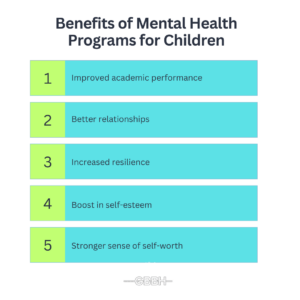Mental health is equally important as your physical well-being. Without proper support, these changes can lead to long-term mental health issues. That’s why mental health programs designed for children are essential in ensuring they grow up healthy and happy. This post explores the importance of providing children with access to the right mental health therapy programs and how these services contribute to their overall well-being.
Understanding Children’s Mental Health
Mental health encompasses a child’s emotional, psychological, and social well-being. It affects how they think, feel, and act, impacting their ability to handle stress, relate to others, and make decisions. Mental health is not merely the absence of mental illness; it includes positive characteristics like resilience, self-esteem, and the ability to form healthy relationships.
According to the National Institute of Mental Health, approximately 1 in 5 children experiences a mental health disorder at some point in their lives. Common disorders include anxiety disorders, depression, attention-deficit/hyperactivity disorder (ADHD), and behavioral disorders. Early intervention and support are vital to help children navigate these challenges and develop healthy coping mechanisms.
Early Intervention: Why It Matters
Children are especially vulnerable to emotional challenges. Stress from school, family situations, or even peer pressure can affect a child’s emotional balance. When these issues are left unaddressed, they can evolve into more serious mental health conditions such as anxiety or depression. Early intervention through mental health treatment centers and across the country ensures that these problems are caught early and treated effectively.
Children who receive early support often show better results in school, social relationships, and personal development. Programs such as cognitive-behavioral therapy (CBT) are designed to help children identify and change negative thought patterns, which can improve their emotional well-being.
The Importance of Early Intervention
1. Preventing Long-Term Issues
Early access to mental health services can prevent the escalation of problems. Children who receive timely support for anxiety, depression, or behavioral issues are less likely to experience severe complications in adolescence and adulthood. Studies show that early intervention leads to:
- Reduced symptoms of mental illness.
- Lower rates of substance abuse.
- Improved quality of life and overall functioning.
Mental health programs tailored for children can address issues before they become ingrained patterns, leading to more favorable outcomes.
2. Enhancing Emotional Resilience
Mental health services can equip children with the tools to understand and manage their emotions effectively. Programs that incorporate Cognitive-Behavioral Therapy (CBT) and Dialectical Behavior Therapy (DBT) teach children how to recognize negative thought patterns and replace them with positive coping strategies. Building emotional resilience is crucial for their ability to face life’s challenges. Key benefits include:
- Self-awareness: Understanding emotions and their triggers.
- Stress management: Developing healthy coping mechanisms for stress and anxiety.
- Problem-solving skills: Learning to approach challenges with a positive mindset.
3. Promoting Healthy Relationships
Children learn to navigate relationships through their interactions with family, peers, and teachers. Mental health services can help them develop social skills, empathy, and effective communication. Group therapy programs, for instance, encourage collaboration and understanding, allowing children to practice these skills in a safe environment. The importance of healthy relationships includes:
- Improved social skills: Learning how to engage positively with others.
- Empathy development: Understanding and relating to the feelings of others.
- Conflict resolution: Gaining tools to manage and resolve interpersonal conflicts effectively.
The Prevalence of Mental Health Disorders in Children
Understanding the prevalence of mental health disorders among children highlights the urgent need for effective mental health services. The Centers for Disease Control and Prevention (CDC) reports that:
- Anxiety Disorders: Affect about 7.1% of children aged 3–17 years, often manifesting as excessive worry, fear, or avoidance of certain situations.
- Behavioral Disorders: Conditions such as ADHD are prevalent, affecting approximately 9.4% of children in the U.S. These disorders can significantly hinder academic performance and social interactions.
- Mood Disorders: About 3.2% of children experience depression, which can lead to severe emotional and behavioral issues if left untreated.
Recognizing the widespread nature of these disorders underlines the necessity for comprehensive mental health services tailored specifically for children.
Types of Mental Health Therapy Programs for Children
There are various mental health therapy programs available to support children dealing with emotional or behavioral issues. Each child is unique, so the best approach depends on the child’s individual needs. Here are some common therapies used in child mental health treatment:
Cognitive-Behavioral Therapy (CBT)
Cognitive-behavioral therapy is a popular approach that helps children understand how their thoughts affect their feelings and behaviors. This type of therapy focuses on identifying unhealthy thought patterns and replacing them with healthier, more constructive ones. CBT is effective in treating conditions such as anxiety, depression, and even trauma.
Dialectical Behavior Therapy (DBT)
Another helpful method is dialectical behavior therapy, which focuses on teaching children how to manage intense emotions and develop better coping mechanisms. This therapy works well for children who may struggle with emotional regulation, self-harm, or extreme mood swings. DBT combines aspects of mindfulness and behavior change, offering children tools to manage their emotional responses.
Acceptance and Commitment Therapy (ACT)
Acceptance and Commitment Therapy is an approach that helps children accept their thoughts and feelings rather than trying to fight them. ACT teaches children to focus on the present moment and make decisions based on their values. This therapy encourages a child’s emotional resilience, helping them navigate difficult situations without becoming overwhelmed.
Group Therapy Programs for Peer Support
Children often feel isolated when dealing with mental health issues. That’s why group therapy programs are beneficial for building connections. Group therapy allows children to share their experiences with others who may be facing similar challenges. This sense of community can help them feel less alone and more understood.
Additionally, being in a group setting fosters communication skills and provides opportunities for children to practice social interactions in a safe and supportive environment. Group therapy can be highly effective in treating social anxiety, low self-esteem, and even trauma.
The Role of Trauma Therapy Programs
Many children who struggle with mental health issues have experienced some form of trauma. Whether it’s bullying, the loss of a loved one, or a more severe form of abuse, trauma can have long-lasting effects on a child’s emotional and psychological well-being. Trauma therapy programs are designed to help children process and heal from these difficult experiences.
Therapies such as trauma-focused CBT and play therapy are commonly used to help children safely explore and resolve their traumatic memories. These programs are essential in helping children regain a sense of safety and control over their lives.
Benefits of Mental Health Programs for Children
Children who receive timely and appropriate mental health care can enjoy numerous benefits.
- Improved academic performance: Children with better mental health often perform better in school as they are more focused and less distracted by emotional challenges.
- Better relationships: Mental health therapy helps children improve their relationships with family, friends, and peers, fostering more positive interactions.
- Increased resilience: By learning coping strategies and emotional regulation, children become more resilient to future challenges.
- Boost in self-esteem: Programs like group therapy and cognitive-behavioral therapy help children develop a stronger sense of self-worth, allowing them to feel more confident in their daily lives.
The Impact of Mental Health on Academic Success
Children’s mental health directly impacts their academic performance. Anxiety, depression, and behavioral issues can hinder concentration, motivation, and overall learning capabilities. Mental health services provide the necessary support for children to succeed academically by addressing these underlying issues. Key insights include:
- Improved focus and concentration: Children receiving mental health support are better able to concentrate on their studies, leading to enhanced academic performance.
- Increased motivation: Addressing mental health concerns can boost a child’s motivation and engagement in school activities.
- Supportive learning environment: Schools that integrate mental health programs into their curriculum create a more conducive learning environment, helping students thrive.
Reducing Stigma Around Mental Health
Access to mental health services for children helps to normalize discussions around mental health, reducing stigma. When children see their peers receiving support, they are more likely to seek help themselves, fostering a culture of openness and understanding. Educating parents, teachers, and communities about the importance of mental health can encourage a proactive approach to seeking help. Initiatives to reduce stigma may include:
- Workshops and training: Providing training for educators and parents on recognizing mental health issues.
- Community outreach: Engaging community resources to promote awareness and acceptance of mental health care.
- Support groups: Creating spaces for children and parents to share experiences and learn from one another.
Finding the Right Mental Health Treatment Center in Massachusetts
If you’re looking for a mental health treatment center in Massachusetts, it’s essential to choose one that specializes in children’s therapy. A well-rounded center will offer various mental health therapy programs, including trauma therapy programs, cognitive-behavioral therapy, dialectical behavior therapy, and acceptance and commitment therapy. These centers provide tailored solutions to help children overcome their mental health struggles in a supportive environment.
The right treatment center will also involve families in the process, as parental support is crucial for a child’s recovery. A comprehensive treatment plan will include family counseling sessions to ensure that children have a solid support system at home.
Conclusion
With early intervention and the right mental health programs, children can overcome emotional and psychological challenges and thrive in all aspects of life. Whether through cognitive-behavioral therapy, acceptance and commitment therapy, or group therapy programs, mental health services provide children with the tools they need to navigate their emotions and grow into healthy, well-adjusted adults.
If you’re concerned about your child’s mental health, seeking support from a mental health treatment center in Massachusetts can be a life-changing step toward ensuring their long-term well-being. Call us at (888)278-0716 today to learn more about our services and how we can help you on your journey to recovery!
FAQ on Why Mental Health Services Are Crucial for Children’s
What types of mental health services do you offer at Greater Boston Behavioral Health?
We provide a range of mental health services, including individual therapy, group therapy, cognitive-behavioral therapy (CBT), dialectical behavior therapy (DBT), trauma therapy, and acceptance and commitment therapy (ACT). Our programs are designed to address various mental health issues and support our clients’ emotional well-being.
How can I schedule an appointment at Greater Boston Behavioral Health?
To schedule an appointment, you can call our office directly or fill out the contact form. Our team will assist you in setting up an initial assessment to discuss your needs and determine the best treatment options.
Are your mental health programs suitable for children?
Yes, we offer specialized mental health programs tailored for children and adolescents. Our experienced therapists utilize age-appropriate therapeutic techniques to help younger clients cope with emotional and psychological challenges.
Do you accept insurance for mental health services?
We accept a variety of insurance plans. Please contact our billing department to confirm your coverage and understand any out-of-pocket costs you may incur.
What should I expect during my first therapy session?
During your first therapy session, you will meet with a licensed therapist for an initial assessment. They will discuss your mental health history, current challenges, and goals for therapy. This session aims to establish rapport and create a personalized treatment plan.
How long does each therapy session typically last?
Therapy sessions usually last between 45 to 60 minutes, depending on the specific needs of the client and the type of therapy being provided.


